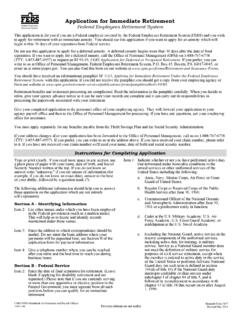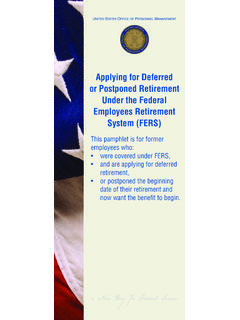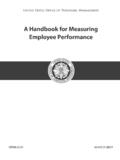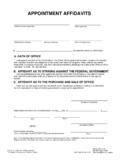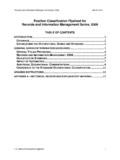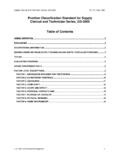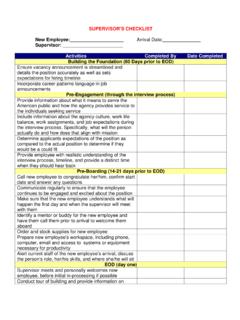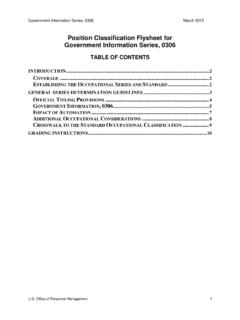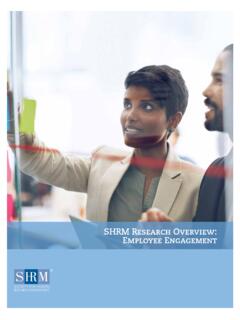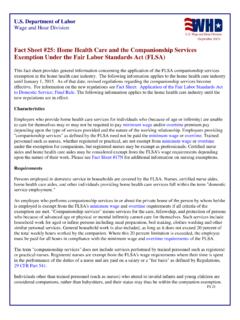Transcription of home health care; - United States Office of Personnel …
1 Federal Benefits FastFacts The Federal Employees health Benefits (FEHB) Program and Medicare * What is Medicare? Medicare is health insurance for people: 65 years of age or older; Under 65 years of age with certain disabilities; and Any age with End Stage Renal Disease (permanent kidney failure requiring dialysis or a transplant). * What does Medicare cover? Medicare has four parts: Part Type of Coverage Monthly Premium? A Hospital No (in most cases) B Medical Yes C Comprehensive It depends (see Medicare & You handbook) D Prescription Drug Yes * Do FEHB Plans and Medicare cover the same types of expenses? Generally, plans under the FEHB Program help pay for the same kind of expenses as Medicare. Some FEHB plans may provide coverage for certain items that Medicare doesn t cover, including but not limited to: routine physicals, and emergency care outside of the United States ; some preventive services; dental and vision care.
2 Medicare may cover some services and supplies that some FEHB plans may not cover, including but not limited to: Some orthopedic and prosthetic devices, and durable medical equipment; home health care; limited chiropractic supplies. * Since I have FEHB coverage, do I need Medicare coverage? The decision to enroll is yours. Medicare Part A - If you are entitled to Part A without paying the premiums, you should take it, even if you are still working. This may help cover some of the hospital related costs that your FEHB plan may not cover, such as deductibles, coinsurance, and charges that exceed the plan's allowable charges. Medicare Part B - If you are retired and enrolled in a fee-for-service (FFS) plan such as: Blue Cross Blue Shield (BCBS), GEHA, and Mail Handlers, Part B and your FFS plan may combine to provide almost complete coverage for all medical expenses. Refer to Section 9 of your plan s brochure to see how your FEHB plan works with Medicare.
3 If you are enrolled in an HMO, you may not need Part B. HMOs provide most medical services for small copays. However, you may want to consider Part B as it: Pays for costs involved with seeing doctors outside the Plan s network Pays for costs for non-emergency care in the if travel involved Is required for Medicare Advantage and Tricare If you are working and have FEHB or you are covered under your spouse s group health insurance plan, then you do not have to enroll in Part B when you turn 65. You will have a special enrollment period when you retire or your spouse retires to enroll in Part B without paying a penalty. Medicare Part C - Part C is a way to get Medicare benefits through private companies approved by Medicare. Enrollees may receive additional benefits such as vision, dental, and/or podiatry that Part A and Part B don t cover. If you wish to enroll in a Medicare Advantage plan, you must be enrolled in Part A and Part B. You should contact your retirement Office to discuss the option of suspending your FEHB enrollment.
4 Medicare Part D - Federal retirees and employees will likely not benefit from enrolling in Part D as they already have comprehensive drug coverage through their FEHB plan. However, retirees with limited resources may want to consider enrolling in Part D if they qualify for extra financial help under the Part D program. * If I decide to enroll in Medicare, when do I apply? Contact your local Social Security Office for more information on when to enroll in Medicare. * Is my FEHB plan or Medicare the primary payer? Your FEHB Plan must pay benefits first when you are an active Federal employee or reemployed annuitant and either you or your covered spouse has Medicare. (There is an exception if your reemployment position is excluded from FEHB coverage or you are enrolled in Medicare Part B only.) Medicare must pay benefits first when you are an annuitant, (unless you are a reemployed annuitant, see above), and either you or your covered spouse has Medicare * Will my FEHB premiums be reduced if I enroll in Medicare?
5 Your FEHB premiums will not be reduced if you enroll in Medicare. Retirees pay the same FEHB premium as active employees. * Can I change my FEHB enrollment when I become eligible for Medicare? Yes, you may change your FEHB enrollment to any available plan or option at any time beginning 30 days before you become eligible for Medicare. You may use this enrollment change opportunity only once. You may also change your enrollment during the annual Open Season, or because of another event that permits enrollment changes such as a change in family status. See qualifying life events (QLE) at: * Should I change plans? Once Medicare becomes the primary payer, you may find that a lower cost FEHB plan is adequate for your needs, especially if you are currently enrolled in a plan's high option. Also, some plans waive deductibles, coinsurance, and copayments when Medicare is primary. Carefully review your plan s benefits before you make any changes. * How Can I Get More Information About Medicare and FEHB?
6 The FEHB website at: Your FEHB plan brochure The Medicare website at The Medicare & You handbook at By calling 1-800-MEDICARE (1-800-633-4227) or TTY 1-877-486-2048. If you are a CSRS or FERS annuitant, you may call OPM s Retirement Office at 1-888-767-6738 or 202-606-0500 from the metropolitan Washington, DC area.
